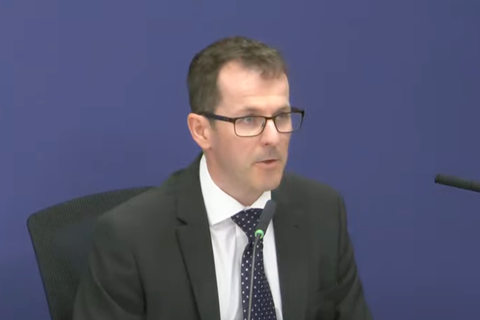A solicitor who formerly advised the Post Office has denied warning a sub-postmaster that the organisation would ‘ruin’ him if he did not settle litigation pre-trial.
Stephen Dilley, who had conduct of the case against Lee Castleton in 2006, told the Post Office Inquiry today that the language allegedly used by him made him ‘sound like a Vinnie Jones character from an East End gangster film’.
He added: ‘I know myself and it just doesn’t sound like language I would use.’
Castleton has previously told the inquiry that when he told Dilley he intended to defend a claim from the Post Office in court, the solicitor had said: ‘Lee, just listen, we will ruin you. Think of your family.’
Castleton was accused of causing a £25,000 shortfall in accounts at his Bridlington branch and was made bankrupt following a week-long trial in December 2006 in which he was unrepresented.
Castleton was subject to one of the first civil claims brought by the Post Office against former employees, in addition to the criminal cases where theft and fraud were alleged. Post Office relied on the Horizon IT system to show gaps in the accounts, but the system was found to be faulty and many of the convictions were overturned.
Dilley, now a partner with Womble Bond Dickinson but then with predecessor firm Bond Pearce, was summoned to appear before the inquiry today – the first lawyer to give oral evidence about the cases brought against sub-postmasters.

Asked at the outset by inquiry counsel Julian Blake whether he had anything to say to Castleton and his family, Dilley replied: ‘No I don’t think so.’
Blake asked whether he bore any responsibility for what happened to Castleton, to which Dilley responded: ‘I am satisfied I acted and my firm acted professionally and politely and appropriately at all times.’
Dilley was pressed on the Post Office’s motivation for bringing the case against Castleton, who made a counterclaim at the time for lost earnings. The solicitor repeatedly said that the case was initially about debt recovery but he accepted that this goal changed over time.
The inquiry saw an email from Dilley to Mandy Talbot, the Post Office’s in-house solicitor, which discussed a ‘tactical preference to getting Castleton tried’ before another case involving a sub-postmaster claiming the Horizon system was faulty.
In a later email, Dilley said there was a ‘bigger picture’ to the Castleton case and that the Post Office ‘wishes to be seen to be taking this claim very seriously to defend the Horizon system and to discourage other sub-postmasters from pursuing other claims’.
Blake suggested that the Post Office, with Dilley’s assistance, was trying to ‘make an example’ of Castleton and the sub-postmaster was ‘effectively sacrificed’ to deter other challenges. Dilley told the inquiry that Post Office wanted to show it was willing to defend the system but was not making an example of Castleton.
After the Castleton case concluded, Dilley had said to Talbot in an email: ‘It is frustrating that there is no financial recovery in this instance although we knew that the prospects were slim particularly after he was made bankrupt. Post Office Limited’s main goal in pursuing Mr Castleton was achieved in that we had a good judgment precedent which helps us to defend the Horizon system.’
Asked by Blake if it was ‘fair’ to bankrupt somebody to defend an IT system, Dilley said: ‘The Post Office didn’t bankrupt Mr Castleton.’
Blake asked: ‘Was it fair to engage in legal proceedings against Mr Castleton in a case where he raised important issues with the Horizon system and which resulted in his bankruptcy?’
Dilley said the Post Office had to go to trial because of Castleton’s counterclaim, adding: ‘Post Office tried really hard to settle the case… I do have one regret and that is we were unable to settle it.’
Dilley pointed out the threat to ‘ruin’ Castleton did not appear anywhere in his notes from the time and that when he spoke to Castleton he had expressly told him Castleton was not dishonest. He denied being under pressure from his client, adding: ‘We wanted to do [our] best by them within the rules of the court and you have professional ethics rules. In an adversarial system it is my absolute duty to act in [the client’s] best interests. But I don’t recall [the Post Office] saying to me "Stephen you have absolutely got to win".’
The hearing continues.






























